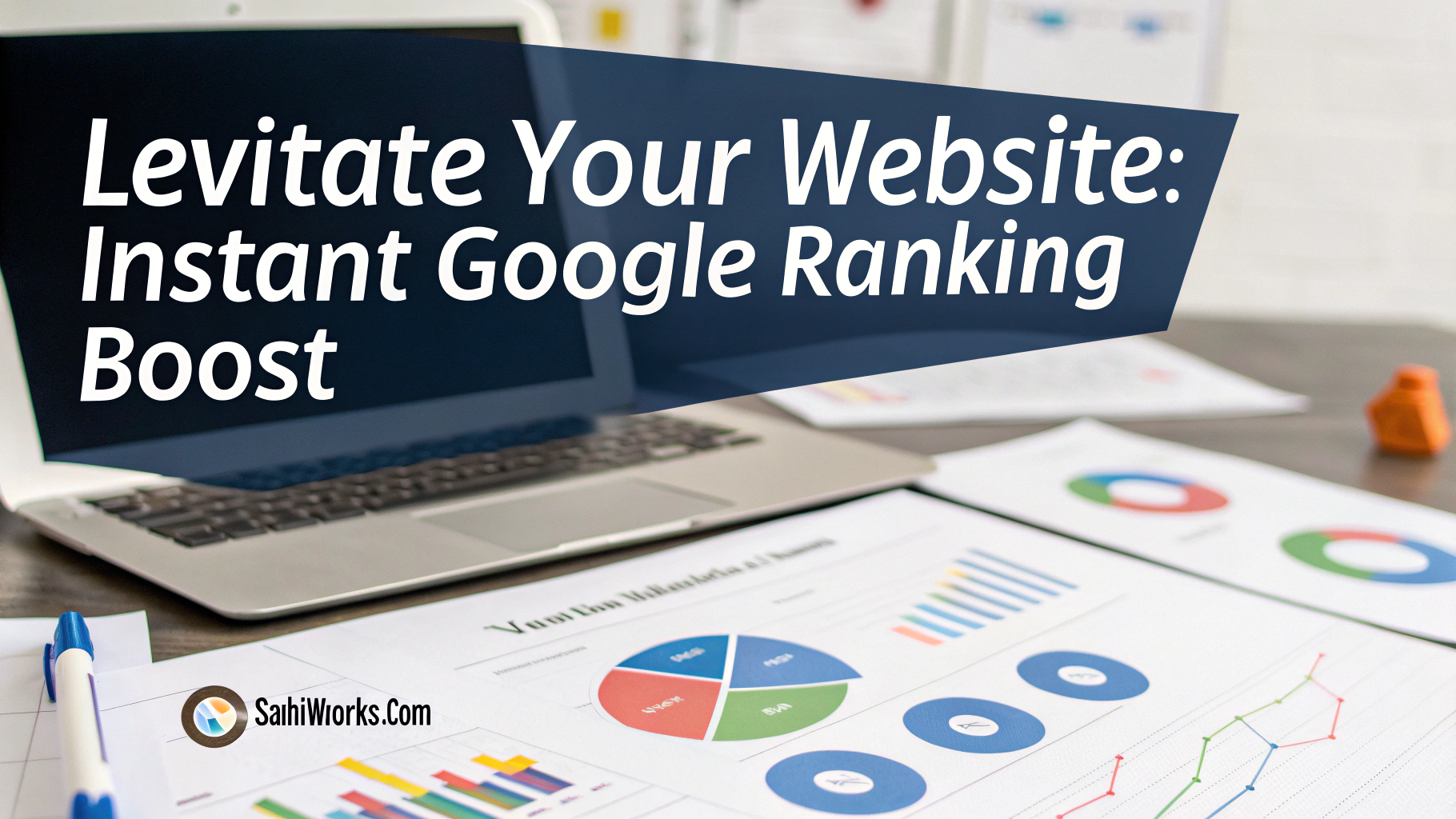Levitate Your Website: Instant Google Ranking Boost
Have you ever wondered why some websites consistently dominate the first page of Google while yours struggles to break through the noise? According to recent data, websites appearing on the first page of Google search results capture 95% of web traffic, leaving just 5% for the remaining pages combined. This staggering disparity is why implementing an effective Rank Boost strategy has become essential for online success. In today’s hyper-competitive digital landscape, understanding how to optimize your website for search engines isn’t just beneficial—it’s absolutely critical for survival and growth.
Why It Matters

The significance of implementing a proper Rank Boost strategy extends far beyond simply appearing in search results. According to a 2023 BrightEdge study, organic search drives 53.3% of all website traffic, substantially outperforming all other channels. Furthermore, the conversion rate for search traffic averages 2.8 times higher than traffic from social media sources.
For businesses, this translates directly to bottom-line impact. A HubSpot analysis revealed that companies ranking in the top three positions for their target keywords experience a 30% higher growth rate than competitors ranking lower. With 75% of users never scrolling past the first page of search results, your visibility on that critical first page can mean the difference between thriving and merely surviving in your market space.
Core Concepts
Understanding the foundational elements of SEO Strategy, Google Ranking is crucial before implementing advanced techniques. Google’s algorithm evaluates over 200 ranking factors, but several core pillars form the foundation of any successful optimization effort:
- Relevance: How well your content matches user intent
- Authority: How trustworthy Google perceives your site to be
- User Experience: How visitors interact with your website
- Technical Health: How well your website functions
Think of these elements as the four legs of a table—each must be strong and balanced for the structure to remain stable. For example, excellent content won’t compensate for poor site speed, just as robust technical SEO can’t overcome irrelevant content. Modern Rank Boost strategies require holistic approaches that address all these factors simultaneously.
Strategy or Implementation Guide
Step 1: Conduct a Comprehensive Audit
Begin with a thorough analysis of your current SEO performance. Utilize tools like Semrush, Ahrefs, or Google Search Console to identify:
- Current ranking positions for target keywords
- Technical issues impacting performance
- Content gaps compared to competitors
- Backlink profile strength and weaknesses
This baseline assessment provides critical data points to measure progress against as you implement your Rank Boost strategy.
Step 2: Optimize Technical Fundamentals
Technical optimization creates the foundation for search visibility:
- Improve page speed (aim for under 3 seconds loading time)
- Ensure mobile responsiveness across all devices
- Implement proper SSL encryption
- Create a logical site architecture with clean URL structures
- Submit an updated XML sitemap to search engines
These technical improvements not only enhance SEO Strategy, Google Ranking but also improve user experience, reducing bounce rates and increasing engagement metrics.
Step 3: Develop Content That Commands Authority

Content remains the cornerstone of effective ranking strategies:
- Create comprehensive, in-depth content that exhaustively covers topics
- Incorporate semantic keywords and related terms
- Structure content with proper H1-H6 hierarchies
- Include multimedia elements (images, videos, infographics)
- Update existing content regularly to maintain relevance
Remember, Google’s primary goal is to deliver the most valuable content to users. Creating exceptional resources naturally attracts both visitors and rankings.
Benefits
Implementing a comprehensive Rank Boost strategy delivers multiple advantages:
- Sustainable Traffic Growth: Unlike paid advertising, SEO benefits compound over time
- Improved Brand Credibility: High rankings correlate with increased trust
- Enhanced User Experience: SEO improvements benefit real users, not just algorithms
- Higher Conversion Rates: Organic visitors typically convert at 2-5x the rate of social visitors
- Competitive Advantage: Effective SEO creates barriers to entry for competitors
These benefits extend across all business types, from local service providers to global e-commerce platforms.
Case Study / Example
Consider the case of TechSolutions, a B2B software provider that implemented a targeted SEO Strategy, Google Ranking initiative last year. Their approach included:
- Content restructuring around customer pain points
- Technical fixes addressing core web vitals
- Strategic internal linking to distribute authority
- Targeted link building to key service pages
Within six months, their organic traffic increased by 143%, with first-page rankings for 37 high-value keywords. Most significantly, their lead generation costs decreased by 62% as they reduced dependency on paid channels.
Tools & Resources
Leverage these powerful tools to accelerate your Rank Boost efforts:
- Google Search Console: Free performance monitoring and indexing insights
- Ahrefs/Semrush: Comprehensive competitive analysis and keyword research
- Screaming Frog: Technical SEO audit and crawl error detection
- Clearscope/Surfer SEO: Content optimization for semantic relevance
- PageSpeed Insights: Performance monitoring and improvement suggestions
These platforms provide the data-driven insights necessary to make informed optimization decisions.
Common Mistakes to Avoid
Be wary of these frequent pitfalls that can undermine your ranking efforts:
- Keyword Stuffing: Overusing keywords creates poor readability and can trigger penalties
- Neglecting Mobile Experience: Mobile-first indexing means desktop-only optimization is insufficient
- Ignoring Search Intent: Matching content to user goals is more important than keyword volume
- Expecting Instant Results: SEO typically requires 3-6 months before significant improvements appear
- Prioritizing Quantity Over Quality: One exceptional piece outperforms multiple mediocre articles
Future Trends
The SEO Strategy, Google Ranking landscape continues evolving rapidly. Watch for these emerging shifts:
- AI-Driven Search: Google’s SGE and generative AI are transforming result formats
- Voice Search Optimization: Conversational queries require different keyword strategies
- Core Web Vitals Expansion: User experience metrics gaining even greater importance
- E-E-A-T Emphasis: Expertise, experience, authoritativeness, and trustworthiness becoming critical ranking factors
Staying ahead of these trends provides competitive advantage as algorithms evolve.
Conclusion
Implementing an effective Rank Boost strategy isn’t optional in today’s digital ecosystem—it’s essential for survival and growth. By focusing on technical fundamentals, creating exceptional content, and staying ahead of algorithmic changes, your website can achieve sustainable visibility that drives meaningful business results.
Remember that SEO is both an art and a science, requiring consistent effort and adaptation. Start implementing these strategies today, and you’ll build momentum that compounds over time, creating a durable competitive advantage in your market.
Ready to transform your search visibility? Begin with a comprehensive audit, prioritize your action items, and commit to the ongoing optimization process that drives lasting results.
FAQs
How long does it take to see results from a Rank Boost strategy?
While some technical improvements can show benefits within weeks, comprehensive ranking improvements typically require 3-6 months of consistent effort before significant results appear.
Is it better to focus on high-volume or long-tail keywords?
A balanced approach works best. High-volume terms build broad visibility, while long-tail keywords often convert better and face less competition. Your strategy should include both.
How important are backlinks in modern SEO?
Despite many algorithm changes, quality backlinks remain one of Google’s top ranking factors. However, relevance and authority matter far more than quantity.
Should I prioritize technical SEO or content creation?
This isn’t an either/or decision. Technical issues can prevent even excellent content from ranking, while perfect technical SEO can’t compensate for poor content. Address critical technical issues first, then focus on content optimization.
How often should I update my SEO strategy?
Conduct quarterly strategy reviews to assess performance and adjust tactics. However, stay informed about algorithm updates year-round, as significant changes may require immediate strategic pivots.

